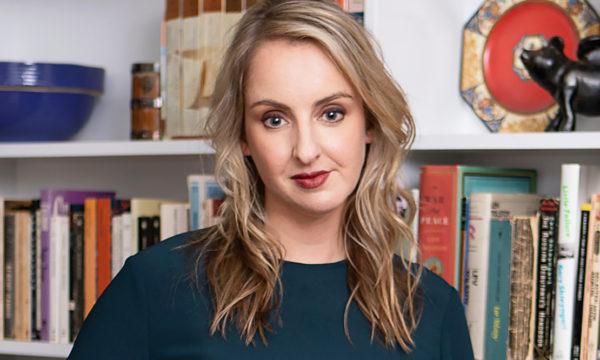What Virginia Woolf Taught Me About Managing Emotions at Work
November 17, 2017 | Filed in: Your Career
When I was in grad school, I was given Virginia Woolf’s To The Lighthouse to read for a seminar. At the time, I found it inaccessible and boring (as sure a sign as any that, at barely 22, I was a little too immature to be in grad school), but I held on to my copy. One day, several months ago, I picked it up and read it in an afternoon. This time around, it blew my mind.
The novel is slim, but it spans decades, and is such an economical and sharp distillation of the complicated relationships between parents and children, men and women, and between friends—as well as the benign and not-so-benign sexism that characterizes many of those relationships—that it felt completely contemporary to me, and I find myself thinking of passages from the novel often.
There is, for instance, the odious Charles Tansley, who is staying with the Ramsay family for the summer. He’s a fairly miserable guy, and thus has to cast around for ways to make himself feel better, which he mostly does by insulting fellow houseguest Lily Briscoe’s painting:
“He was really, Lily Briscoe thought, in spite of his eyes—but then look at his nose, look at his hands—the most un-charming human being she had ever met. Then why did she mind what he said? ‘Women can’t write, women can’t paint’—what did that matter coming from him, since clearly it was not true to him but for some reason helpful to him, and that was why he said it?”
I think about the Charles Tansleys of the world often, since it seems that there are no fewer of them—they’ve just become better at disguising themselves. I also think often of the relationship between Mr. and Mrs. Ramsay, the latter of whom is the heart and soul of the family. She soothes her son’s tantrums, props up her husband’s ego, and tries her best to make her houseguests happy. The novel jumps between the internal monologues of several characters, and Mrs. Ramsay’s is always preoccupied with the happiness of other people. When she dies, the family is adrift.
*
I once had a job where I was praised frequently for my sunny demeanor and good attitude—in fact, it was the feedback I received most often from the most senior people in the organization. I loved it. Being known as sweet, fun, delightful—these were traits I hope would be associated with me for my whole life. It even came up in my performance reviews. But it was never followed by, “And that’s why we’re giving you a raise.”
I also had a job where my boss called me into his office one day to talk about how I “didn’t seem to have the same enthusiasm for my work” as I used to. When I asked if the quality of my work had changed, he said it hadn’t—but he had noticed that I wasn’t in as good of a mood in the office as when I had started.
At that job, I had more than one male colleague who had cultivated a persona of being prickly, difficult, or even downright rude to co-workers (or, who knows—maybe that’s how they were all the time!), especially to those who had roles that they viewed as inessential. (Spoiler alert: they definitely viewed mine as inessential.) My boss was well aware of this dynamic, and excused it as a mark of their personalities, even though I was not the only person who noticed. In that meeting in his office, he never took into account that having to work with people who behaved that way might affect my attitude in the office. He wasn’t actually worried about my happiness—rather, he missed the way that I used to project happiness and enthusiasm in the office, and how that made him feel. When I didn’t do that—couldn’t do that; I left within a few months of that conversation—it unsettled him. I cried in that meeting, and felt ashamed, both for crying and for letting him down.
Re-reading Woolf’s novel, I thought about how women are encouraged to cultivate personality traits that, while certainly worthy in and of themselves, also happen to be soothing to men: being relentlessly positive, eternally “down to get coffee” and have their brains picked by some guy looking to break into the industry, never irritated at being interrupted. Nobody explicitly tells us that we ought to do these things, but there is the pervasive sense that it would be weird not to behave this way.
This would all be fine, if I didn’t also run into men in past jobs who were mercurial, difficult, and frequently in bad moods. Some were extremely good at their jobs. This was taken as the price of genius. But imagine if everyone in an office, men and women, all acted like those geniuses: if we went to work tomorrow, sat down at our desks, worked in silence, and left when we were done. If we didn’t say hello to our colleagues in the morning, or go to the holiday parties or happy hours. Would we be seen as “all business,” or “not team players?” What would the social cost be?
*
In the novel, Mrs. Ramsay truly loves the role she plays. She doesn’t have a “job” in the traditional sense, but she lives to take care of other people. She’s a nurturer, and doesn’t ever really question this role, though the reader gets glimpses of her dissatisfaction. Meanwhile, Lily Briscoe fiercely guards the moments where she isn’t obligated to meet the needs of other people:
“It was all in keeping with this silence, this emptiness, and the unreality of the early morning hour….Life was most vivid then. One could be at one’s ease. Mercifully one need not say, very briskly, crossing the lawn to greet old Mrs. Beckwith, who would be coming out to find a corner to sit in, ‘Oh, good morning, Mrs. Beckwith! What a lovely day! Are you going to be so bold as to sit in the sun? Jasper’s hidden the chairs. Do let me find you one!’ and all the rest of the usual chatter. One need not speak at all…One could not imagine Mrs. Ramsay standing painting, lying reading, a whole morning on the lawn. It was unthinkable.”
*
I like making people feel comfortable. I like making friends at work (or, at least, making friendly conversation). And I’ve never subscribed to the idea that to be a genius one must be impolite.
But I do think it’s important to remember that cheerfulness and care-taking of other people—including other people’s emotions—is not an endlessly renewable resource, at work or in life. When I left the meeting with the boss who told me how unhappy my unhappiness made him, I felt like a failure. I discounted the amount of labor that went into being a happy presence in the office—not realizing that it should have been a sign that, rather than failing to give other people what they wanted, I wasn’t getting what I needed.
I see myself going back to To The Lighthouse many more times in the years to come, admiring Mrs. Ramsay’s devotion to her family, her maternal nature, and the sacrifices that she made for the people she loved, both the ones that she acknowledges and those that she is unaware of. But in my own life, I hope to channel Lily Briscoe, who ignores Charles Tansley and everyone else around her, and, looking at her canvas alone in the early morning, has an epiphany:
“There it was—her picture. Yes, with all its greens and blues, its lines running up and across, its attempt at something. It would be hung in the attics, she thought; it would be destroyed. But what did that matter? she asked herself, taking up her brush again. She looked at the steps; they were empty; she looked at her canvas; it was blurred. With a sudden intensity, as if she saw it clear for a second, she drew a line there, in the centre. It was done; it was finished. Yes, she thought, laying down her brush in extreme fatigue, I have had my vision.”









